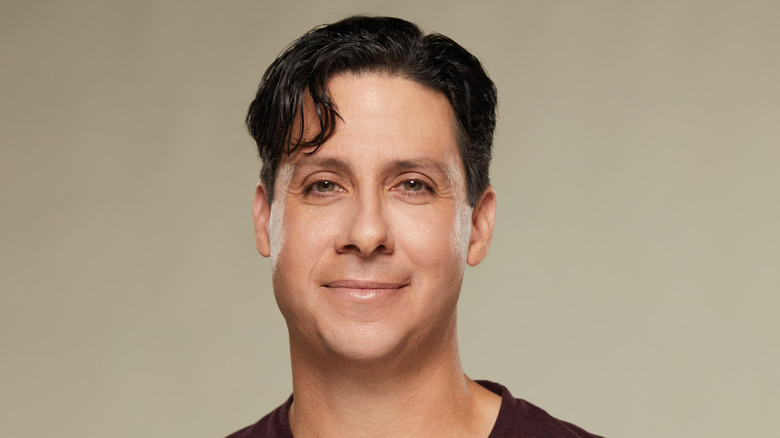Society often inaccurately views people who are different as weird or weak. But being different isn’t bad, and it’s actually more common than you may think. In fact, there are 70 million Americans who learn and think differently. That means 1 in every 5 people have learning and thinking differences like attention deficit hyperactivity disorder (ADHD) and dyslexia (via Understood). If your child has been diagnosed with a learning difference, or you suspect they might have one, “it’s critical to understand that nothing is wrong with your child — their brain is just wired differently,” says Dr. Andrew Kahn.
Dr. Kahn is a licensed psychologist who works for Understood, a social impact non-profit dedicated to supporting the neurodivergent community. He specializes in working with individuals who think and learn differently and has worked within the public school system providing training, evaluations, direct consultation, and therapeutic support to students, their families, and staff for almost 20 years.
In an exclusive interview with Health Digest, Dr. Kahn talked about some of the most common mental health and learning challenges that children face, how adults can recognize if a child is struggling due to being neurodivergent, and tips for parents on how to support their neurodivergent children.
Shedding light on a resource for the neurodivergent community

Can you tell us a little bit about your background and involvement in Understood.org?
Understood.org is the resource for the 70 million people with learning and thinking differences like ADHD and dyslexia. Our mission is to shape the world for difference, so that people with learning and thinking differences can thrive at all points of life — at home, in school, at work, and beyond.
I am a licensed psychologist, and my role at Understood.org is subject matter expert in psychology and learning. My role is to inform and shape a variety of content and resources — including articles, tools and trackers, conversation guides, and more — for individuals, parents, and educators, primarily around topics like ADHD, managing emotions, social-emotional learning, and special education. I’m also the host of Season 1 of the “Understood Explains” podcast, which covers the ins and outs of the process school districts use to evaluate kids for special education services.
Prior to Understood.org, I worked in public schools for nearly 20 years, supporting neurodivergent kids and their families through the evaluation process, and I served as the clinical director at a statewide mental health agency in Maine.
What it means to be neurodivergent
What are some common mental health issues and general learning and behavioral challenges that children face?
Learning and thinking differences are variations in how the brain processes information, and they can impact children’s emotional, social, and academic development.
When it comes to mental health, the reality is that children with learning and thinking differences like ADHD are at a significantly higher risk for developing mental health challenges than their neurotypical peers. Understood.org’s Neurodiversity and Stigma Study also found that parents of kids with learning differences were more than 2-3 times more likely to say their child struggled with managing emotions, anxiety about attending class, and self-confidence compared to parents of neurotypical kids.
Kids with learning differences may experience challenges like test anxiety, an inability to handle criticism, or concerns about future life situations. Neurodivergent kids may also exhibit physical manifestations of their discomfort/anxiety, which can include refusing to eat, frequent complaints of feeling ill, sensory sensitivities that may result in meltdowns, irritability, and poor emotional regulation.
Children with learning and thinking differences are susceptible to a variety of challenges depending on whether they are properly identified, or if they are engaged in the supports and services they need. Some children with ADHD may exhibit common challenges with hyperactivity, impulsive behaviors, and difficulties with social functioning that can garner a lot of adult attention and peer conflict. Children with learning disabilities may also exhibit many of the same behavioral difficulties, as their frustration levels and feelings of ineffectiveness can result in these types of externalizing behaviors (behaviors that are visible and obvious to those around them).
On the other hand, many children with learning disabilities and/or inattentive ADHD may present with more subtle challenges that include task avoidance, withdrawal, refusal to speak, fearfulness, anxiety, or signs of depression. These children may be less likely to receive intervention or be noticed by adults in their environments, as their behaviors are more internalizing (occurring inside of the child) and less disruptive to others.
It is always important to observe children’s behavior with a critical eye, as behavior is often misperceived as “naughtiness” or intentional, rather than as evidence of an overwhelmed child lacking skills to manage their stress and differences.
The impacts of living undiagnosed
SewCream/Shutterstock
Is it common for neurodivergent children to go throughout childhood undiagnosed? How does this affect a child’s mental health?
It is very common for neurodivergent children with more subtle presentations of learning differences to go undiagnosed in childhood, or to be diagnosed significantly later than children with more noticeable forms of misbehavior or learning difficulties. Children who are bright, quiet, well-behaved, or more internalizing in their symptoms of learning differences may go undiagnosed for years. This is particularly true for girls with learning and thinking differences, as females are far less likely to receive a diagnosis of ADHD than males.
The impact of going undiagnosed can be significant, as current research indicates that children with learning and thinking differences are already at greater risk for mental health challenges. Neurodivergent children who go undiagnosed are more susceptible to being misidentified as oppositional, “naughty,” or lazy when their needs for intervention, social skills support, and learning differences go unmet.
One of the main reasons why children may be undiagnosed is because of parents’ concern about being labeled or stigmatized. Harmful biases and misconceptions exist — that the child is not smart, or that the diagnosis is a product of bad parenting — that can make neurodivergent kids and their families feel “less-than” or alone. Stigmas can also affect how teachers and adults view young girls, who may be less likely to exhibit stereotypical signs of hyperactive ADHD and misbehavior. While stigmas can feel scary, it’s important that parents still seek support from a physician or psychologist to ensure their child gets the support they need to thrive.
Signs a child may have a learning or thinking difference
Sergey Novikov/Shutterstock
How can adults recognize if a child is struggling due to being neurodivergent? What signs can parents and educators look out for to identify if a child has a learning or thinking disability?
While every child and situation is different, there are some key signs of learning differences parents and educators can look out for. Ask yourself:
• Does the child struggle with paying attention or sitting still? Maybe they have trouble focusing on an activity for an extended period of time, they fidget and fiddle with things, or they interrupt a lot or talk constantly.
• Does the child lose track of items or thoughts? Perhaps they lose objects, forget to take important items back and forth from school, or have trouble following directions or telling a story in a logical way.
• Does the child struggle with subjects like math, reading, or writing? In math, they may have trouble understanding math symbols, like “7” means “seven,” or have trouble estimating. In reading, the child could have trouble sounding out words or avoid reading altogether. In writing, the child may have trouble forming letters or holding and controlling a pencil.
• Does the child have challenges in social situations? Maybe they struggle with social cues, say inappropriate things, withdraw from conversations with other kids, or play too rough.
As a parent or guardian, it’s important to remember you are the first expert on your child. If you notice signs of learning differences, trust your gut and explore them. Use a log or tracker to jot down behaviors you see and when and where they happen. Talk with your child’s educator about behaviors they’re seeing, as their experiences in the classroom can provide you with more of a 360-degree view.
For parents or educators who think a child may have a learning or thinking difference, Take N.O.T.E. is a step-by-step tool that can help them spot signs of learning differences by “Noticing,” “Observing,” “Talking,” and “Engaging.”
How to support your child
Alex and Maria photo/Shutterstock
Can you provide some tips for parents on how to speak with their child about learning or thinking differently than others?
Talking with your child about learning differences can be difficult, but it is a critical first step to understanding what your child is experiencing and finding them the right support. My favorite tips include:
• Make sure your child knows you’re there for them and that you’ll work through challenging times together. Help your child understand that nothing is wrong with them and that you understand how they’re feeling. Even if you don’t have all of the answers just yet, reassuring your child that you’ll get through it together can go a long way.
• When your child opens up to you, try to validate their feelings. Even if you don’t fully understand what they’re experiencing, remember that what they’re feeling is real to them. It’s important that they understand their emotions aren’t right or wrong.
• Ask open-ended questions to gather more insight. Questions like “What was the hardest thing you did at school today?” or “What did you like most about this project?” can provide more context as to what your child enjoys or finds difficulty in and can get you one step closer to supporting them.
• Use a feelings wheel to help guide the conversation. If your child has challenges talking about their emotions or using words to describe how they feel, feelings wheels can help them make connections between feelings, body sensations, and words.
• If you feel yourself getting worked up when talking to your child, take some time away. Practice self-control and awareness by letting your child know they haven’t done anything wrong — you just need a breather or break before continuing the conversation. This will help you manage your own emotions, and show your child in practice what self-control looks like.
Prioritize self-care

Rido/Shutterstock
What advice do you have for parents on how to navigate their own understanding and emotions around having a neurodivergent child?
If and when your child receives a diagnosis, you may feel sad, angry, disappointed, and worried. All of those feelings are valid and common. But it’s critical to understand that nothing is wrong with your child — their brain is just wired differently. Although their path may look different, there are many great routes forward to help your child develop the skills and strategies to reach their life goals.
One of the most important things for parents to do early in the process is forgive themselves, because they haven’t done anything wrong. Many parents are hard on themselves for not noticing signs or not seeking support sooner. But now that you know your child has differences, you can start the process of learning more about them. Accessing quality resources that are grounded in research and expertise is an important starting point.
Parents often benefit from joining online or in-person support groups, like Understood.org’s app Wunder, to share their experiences and learn from other parents who are navigating many of the same challenges. Ensuring you have well-researched and accurate information about your child will go a long way toward addressing stigmas, learning the best ways to approach your child, and understanding how to advocate for them in school and the community.
Also, prioritize self-care. Never forget the advice you get on planes — when those oxygen masks drop down, you put yours on first. Life is really no different. If you’re not practicing the self-care you need, you will have less patience and energy to navigate challenges and opportunities with your child.
The mission of Understood is to help those who learn and think differently discover their potentials, take control, find community, and stay on positive paths along each stage of life’s journey.
This interview was edited for clarity.


